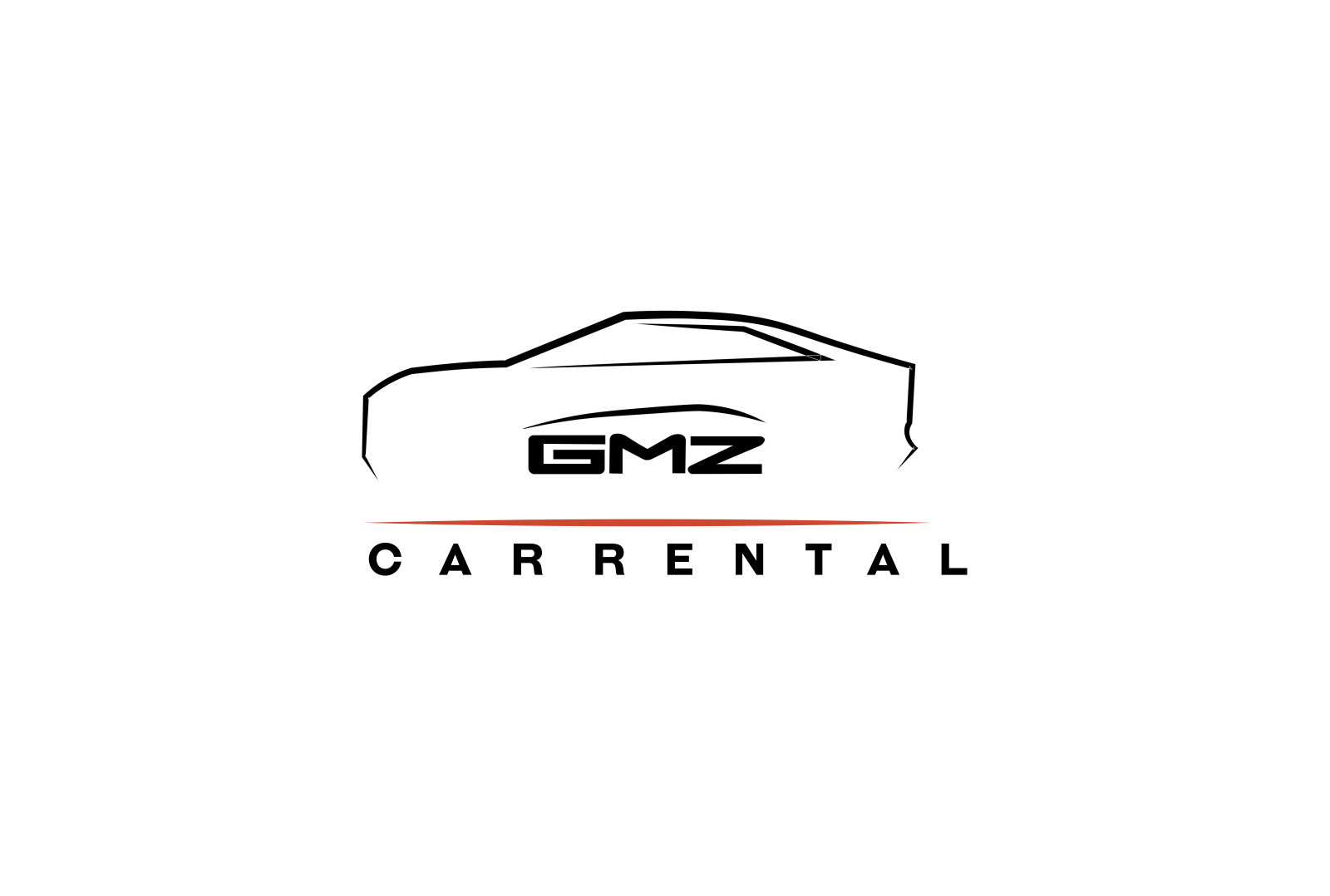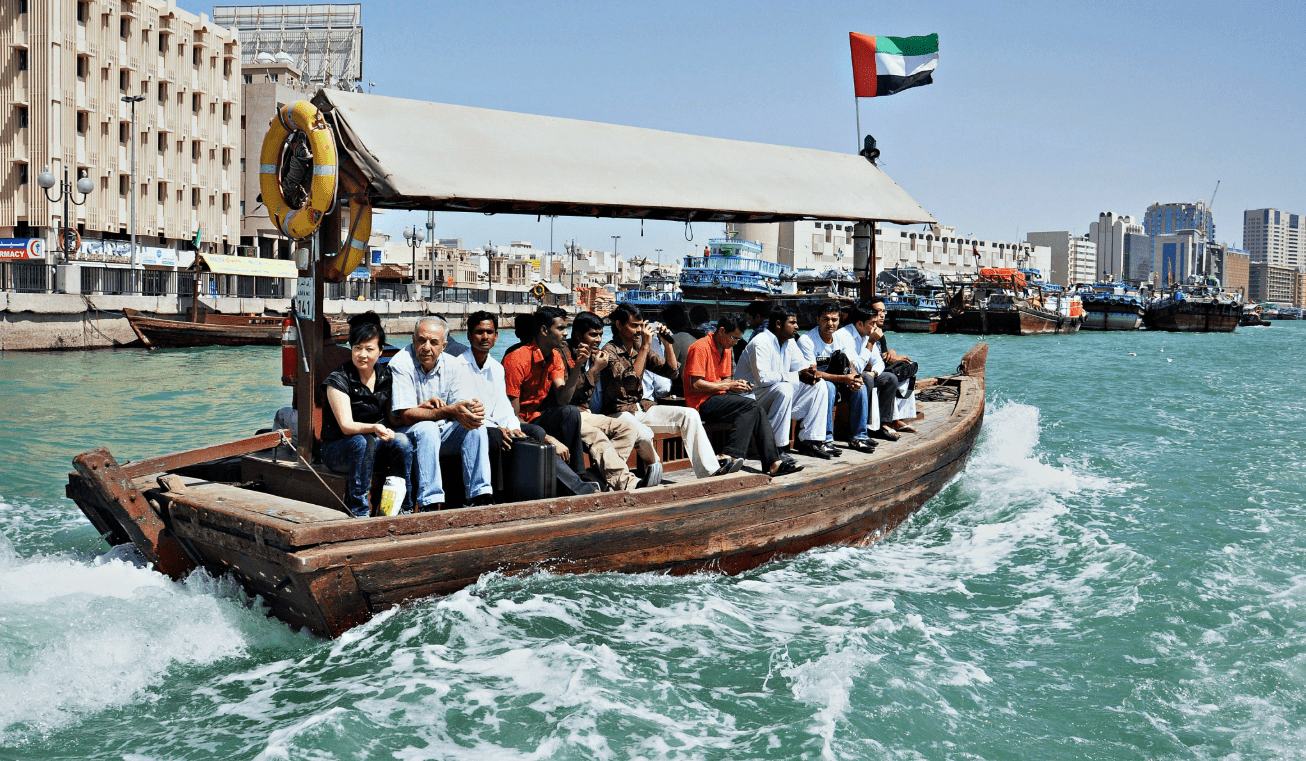The abra is a traditional wooden boat that has ferried passengers across Dubai Creek for centuries, connecting historic neighborhoods like Bur Dubai and Deira. It remains a practical and affordable way to cross the creek, offering quick rides at a low cost. Using an abra to travel between these districts is an authentic experience that combines convenience with a glimpse into Dubai’s maritime heritage.
Rides usually cost just one dirham, making the abra one of the cheapest transport options in the city. The boats run frequently throughout the day, with multiple stations located along the creek. This simple mode of transport is popular with both locals and tourists seeking an easy way to navigate the city while enjoying unique water views.
The abra is a traditional wooden boat that has ferried passengers across Dubai Creek for centuries, connecting historic neighborhoods like Bur Dubai and Deira. While it remains one of the most affordable ways to cross the creek, many travelers also combine this authentic ride with a car rental in Dubai for more flexibility when exploring modern attractions. Services like GMZ Car Rental make it easy to balance cultural experiences like abra rides with the comfort of traveling across the wider city.
What Is Abra Dubai?
Abra Dubai refers to traditional wooden boats that operate on Dubai Creek. These small vessels have specific designs and functions which highlight their importance in the city’s daily life and transport system.
They come in different types and possess unique physical and operational characteristics. Their history is rooted in Dubai’s growth from a trading port to a major urban center.
Historical Significance
Abras have served as a vital mode of transport in Dubai for centuries. Before modern infrastructure like bridges or metro lines, these boats connected the neighborhoods of Deira and Bur Dubai, facilitating trade and daily commuting.
They were essential for traders, fishermen, and local families. The word “abra” means “to cross” in Arabic, reflecting their core purpose.
Today, abras symbolize a link to Dubai’s cultural heritage, preserving a way of life amid rapid urban development. Their continuing operation maintains a connection to the city’s maritime and trading past.
Types of Abras
There are mainly two types of abras in Dubai:
- Traditional Wooden Abras: Handcrafted from wood, these abras have a simple, classic design. They usually seat around 20 passengers and are motorized for easy navigation.
- Self-Driving Abras: Introduced as part of Dubai’s initiative for sustainable and smooth public transport, these autonomous boats are a recent addition aiming to reduce carbon emissions.
The traditional abra remains overwhelmingly common for daily ferrying, while self-driving ones are slowly being integrated into the transport network.
Unique Features
Abras are distinct for their wooden construction and compact size, which allow them to navigate the narrow waters of Dubai Creek efficiently. Each boat accommodates about 20 passengers for short rides averaging 10 minutes.
They operate on fixed routes between important creekside stations such as Bur Dubai and Deira, with affordable fares set by the RTA (Roads and Transport Authority).
The ride offers distinctive views of the old city, textile souks, and waterfront activity. Abras also stand out as a cost-effective, scenic, and culturally immersive transport option compared to modern alternatives in Dubai.
Abra Routes and Destinations
The abra operates on key routes across Dubai Creek, connecting major points in Bur Dubai and Deira. It serves daily commuters and tourists alike, with stops near bustling markets and cultural sites. Understanding the main routes, stations, and nearby attractions is essential for planning trips efficiently.
Dubai Creek Crossings
The abra primarily crosses Dubai Creek on two main routes. The first connects the Deira Old Souk Abra Station to the Bur Dubai Abra Station. This route is popular for quick access between busy market areas on both creek banks.
The second main crossing links Al Sabkha Abra Station with the Dubai Old Souk Abra Station in Bur Dubai. This route supports local transportation and serves those traveling for business or leisure.
Both routes involve short rides, generally about 10 minutes, providing an efficient alternative to road traffic congestion while offering scenic views of Dubai Creek’s waterway.
Major Abra Stations
There are several key abra stations evenly distributed along the creek. The most frequented ones include:
- Deira Old Souk Abra Station: Gateway to traditional markets and souks.
- Bur Dubai Abra Station: Close to historic sites and commercial centers.
- Al Sabkha Abra Station: Links residents and workers near the Al Sabkha area.
- Dubai Old Souk Abra Station: Near cultural attractions and shopping options.
These stations serve as transit points for thousands each day, balancing tourist needs and local traffic demands.
Nearby Attractions
Abrа routes provide access to several prominent tourist and cultural attractions. Near the Deira Old Souk Station, visitors can explore the Gold Souk and Spice Souk, known for their vibrant market experience.
On the Bur Dubai side, the Abra stops are close to Al Fahidi Historical Neighborhood and Dubai Museum, offering insights into the city’s heritage.
The floating nature of the abra and proximity to historical sites add authentic charm to the journey, making these crossings more than just transportation.
How to Ride an Abra
Riding an abra in Dubai is straightforward with clear schedules, affordable fares, and safety measures in place. Passengers should be aware of operating hours, how to pay for tickets, and key safety guidelines before boarding.
Timetables and Operating Hours
Abras generally operate from early morning until late evening, covering peak commuter times. Typical hours run from around 6:00 AM to 11:00 PM, but these can vary slightly depending on the route and season.
Most abrasion services on Dubai Creek maintain consistent intervals, with boats arriving every 3 to 5 minutes during busy hours. Passengers should plan to arrive a few minutes early, especially during weekends and holidays, to avoid waiting.
Some petrol and electric abras used for heritage or sightseeing tours may have shorter or specific operating hours. Checking local timetables at stations or online is recommended to ensure accurate times.
Ticket Prices and Payment Options
Standard abra rides across Dubai Creek typically cost about 1 AED per trip. This fee is fixed for public abras and makes crossing affordable for residents and tourists alike.
Payments are usually made directly to the boat operator in cash. Small bills or coins are preferable as change may not always be available.
Private abra rides or heritage tours can cost significantly more depending on duration, the route taken, and services included. Booking these in advance through official channels or authorized vendors is advisable.
Some electric abras and water taxis may accept electronic or card payments, but cash remains the most common and reliable option across traditional abra services.
Safety Guidelines
Passengers are advised to wait in designated areas before boarding to avoid crowding near the docks. Arabas typically have basic safety features like life jackets, especially for children.
It is important to remain seated while the abra is in motion to maintain balance on the small vessel. Abras accommodate up to 20 passengers, so overcrowding is generally controlled by operators.
In bad weather or high temperatures, abra services may pause for safety reasons. Travelers should check with service providers or station staff if conditions seem unfavorable.
Passengers should follow instructions from the boat operator, avoid leaning over the sides, and handle luggage carefully to prevent accidents.
Popular Experiences on Abra Dubai
Abra Dubai offers diverse experiences that highlight the city’s unique waterways and heritage. Options range from relaxing scenic rides to personalized journeys and educational explorations. Passengers can find experiences tailored to leisure, privacy, or cultural insight.
Sunset Cruises
Sunset cruises on an abra provide a calm and visually striking way to enjoy Dubai’s skyline. These rides typically last 60 to 90 minutes and run along Dubai Creek or the newer Dubai Canal. Passengers witness the transition from daylight to illuminated city vistas, capturing views of historic neighborhoods and modern architecture.
Many operators include refreshments and light snacks during the cruise. The timing is crucial, often starting 30 minutes before sunset to maximize views. This experience is popular for couples and photographers seeking a unique perspective of the city’s vibrant colors at dusk.
Private Charters
Private charters on abras allow for customized trips that prioritize privacy and flexibility. These can be booked for small groups, families, or business meetings. The routes and duration vary based on customer preferences, making it suitable for celebrations or intimate gatherings.
Charters often feature tailored services, such as onboard dining or guided commentary. Passengers can request specific routes, including longer cruises through both traditional and modern waterways. Pricing depends on the level of customization and duration, generally higher than standard crossings.
Cultural Tours
Cultural tours on abra focus on exploring Dubai’s maritime history and the life around Dubai Creek. These guided tours often include stops at heritage sites on both Bur Dubai and Deira sides. Visitors learn about the traditional uses of abras and their significance in daily life and commerce.
Tours typically last 45 to 60 minutes and are led by knowledgeable guides explaining the architecture, markets, and the city’s evolution. This experience provides direct insight into the authentic lifestyle historically connected to Dubai’s waterways and complements visits to nearby souks and museums.
Tips for Tourists
Tourists should aim to take the abra ride during cooler hours, such as early morning or late afternoon, to avoid the midday heat. The ride costs around AED 1, making it an affordable and authentic way to explore Dubai Creek.
For those planning a full-day itinerary, combining abra rides with a car rental in Dubai ensures seamless travel. After exploring souks and museums near the creek, visitors can switch to a rented vehicle for easy access to attractions like Downtown Dubai, Jumeirah Beach, or Palm Jumeirah. GMZ Car Rental offers a wide range of vehicles, from luxury models to budget-friendly options, catering to every traveler’s needs.
Passengers are advised to board at the Deira or Bur Dubai docks near the Gold Souk for easy access. The traditional wooden boat offers open-air seating, so travelers should dress appropriately for sun exposure and occasional wind.
Haggling is common in the nearby markets like Al Karama after disembarking from the abra. Tourists should carry small denominations of cash, as abras do not usually accept cards.
It helps to bring a camera or smartphone, as the views of old Dubai’s skyline, souks, and waterfront provide good photo opportunities. The rides take just a few minutes but offer a unique glimpse into the city’s heritage.
Safety is generally good, but passengers should hold onto their belongings, especially when the abra is crowded. The boats operate regularly and can be used for quick crossings or leisure trips.
| Tip | Detail |
|---|---|
| Cost | AED 1 per ride |
| Best times | Early morning or late afternoon |
| Boarding points | Deira and Bur Dubai docks near Gold Souk |
| Payment | Cash only |
| Dress | Light clothing, sun protection |
| Cameras | Recommended for photos |
Sustainability and Modernization
The abra in Dubai is evolving through eco-friendly initiatives like electric and 3D-printed boats. Similarly, transport options across the city are also modernizing, with sustainable taxis and convenient services like GMZ Car Rental supporting eco-conscious travel.
Eco-Friendly Initiatives
Dubai has introduced electric abras that reduce emissions and noise pollution compared to traditional diesel-powered boats. These electric abras are partly 3D-printed, using cutting-edge technology to lower manufacturing waste and energy consumption.
The electric abras maintain the iconic design of traditional abras but incorporate modern materials and propulsion methods. This balance retains cultural heritage while significantly improving the environmental footprint.
Key benefits include:
- Zero local emissions during operation
- Lower energy use through electric motors
- Use of sustainable and lightweight materials in construction
This approach positions Dubai’s abra as a model for eco-friendly maritime transport while supporting the city’s 2030 Environmental Agenda.
Integration with Dubai Transport
The Roads and Transport Authority (RTA) integrates electric abras within Dubai’s public transport network, aiming to serve up to 22 million passengers by 2030. These water taxis connect key points along Dubai Creek, complementing buses, metro lines, and trams.
Infrastructure upgrades support the new abras, including modern docking stations designed for efficient charging and passenger flow. The RTA’s broader modernization plan involves renovating existing terminals and expanding the abra fleet.
This integration enhances connectivity in Dubai by providing a sustainable, low-emission option that reduces road congestion. The abra plays a strategic role in the emirate’s vision of a multi-modal and environmentally responsible transport system.
Events and Seasonal Activities
Seasonal events along Dubai Creek add cultural depth and entertainment to the abra experience. Visitors often encounter unique festivals and occasionally themed rides designed to enhance their journey across the water.
Festivals on Dubai Creek
Dubai Creek comes alive during major city festivals such as the Dubai Shopping Festival and the Dubai Food Festival. These festivals offer vibrant market scenes, cultural performances, and special exhibits near the creek, contributing to the atmosphere seen from an abra ride.
Visitors crossing the creek on abras during these periods witness bustling traditional souks and decorated waterfronts. The festivals occur mainly between January and March, making this a lively time for those seeking both local culture and scenic crossings in a dynamic setting.
Special Themed Rides
From time to time, Dubai introduces themed abra rides to coincide with seasonal events or holidays. These rides may include decorated boats or combined experiences like sunset rides paired with cultural storytelling.
Such offerings often appear during public holidays or school breaks, targeting families and tourists. While standard abra fares remain low, special themed rides may require advance booking or nominal additional fees for the enhanced experience.
Abra Dubai in Media and Culture
The abra holds a significant place in Dubai’s cultural identity. It is frequently depicted in media as a symbol of the city’s heritage, connecting the modern skyline with its historic roots.
Artists and filmmakers often showcase abras crossing Dubai Creek to highlight the traditional way of life before rapid urban development. This imagery evokes Dubai’s maritime past and its role as a trading hub.
In contemporary culture, abras have inspired creative projects such as the “Abra Fusion,” where local and global artistic styles merge. These artworks reflect both tradition and innovation.
The abra also appears in tourism promotions to attract visitors wanting authentic cultural experiences. Its representation emphasizes accessibility, with fares as low as 1 AED encouraging widespread use.
Technological advances have entered this traditional space. The emergence of 3D-printed and electric abras combines heritage with sustainability, attracting attention in design and engineering media.
Key cultural aspects of the abra:
| Aspect | Description |
|---|---|
| Symbolism | Represents Dubai’s historical connection to trade and waterway transport |
| Art and Creativity | Inspires artistic projects influenced by folklore and modern movements |
| Media Presence | Featured in films, documentaries, and tourism materials |
| Innovation Impact | Introduction of electric and 3D-printed abras highlighting modern technology |
These elements underline the abra’s ongoing relevance in Dubai’s cultural and media landscape.
Conclusion
The abra is more than just a boat ride — it’s a journey into Dubai’s heritage. For travelers who want to balance tradition with modern convenience, riding an abra across Dubai Creek and then continuing the trip with a car rental in Dubai is the perfect combination. With trusted providers like GMZ Car Rental, visitors can enjoy the best of both worlds: authentic cultural experiences and the freedom to explore the city at their own pace.
Frequently Asked Questions
Abra rides in Dubai operate on defined schedules, with fares that vary based on the route and distance. Stations are located at key points such as Bur Dubai and Deira, accessible by public transport.
What are the operating hours for Abra rides in Dubai?
Abra services generally run from 5 a.m. until midnight on most routes. Some routes operate 24 hours, providing round-the-clock accessibility.
How much does a ride on the Dubai Creek Abra cost?
A standard Abra ride typically costs 1 AED. Prices can increase up to 120 AED for longer or special routes.
Where can I find the Abra stations in Bur Dubai?
Abra stations in Bur Dubai are situated along Dubai Creek, near popular markets and transit points. Staff are available to assist passengers at these locations.
What is the best way to reach Abra stations using the Dubai Metro?
Travelers can use the Dubai Metro to reach the nearest stations, such as Al Fahidi or BurJuman, then walk or take a short taxi ride to the Abra docks.
Are there different types of Abra boats available for rides in Dubai?
Yes. Traditional wooden Abras are common, but there are also electric Abras operating on routes like the Dubai Water Canal.
What are the ticketing options for Abra rides at Deira Dubai?
Tickets at Deira are typically bought on board with cash. Some routes may offer electronic ticketing options, depending on the location and operator.



0 Comment